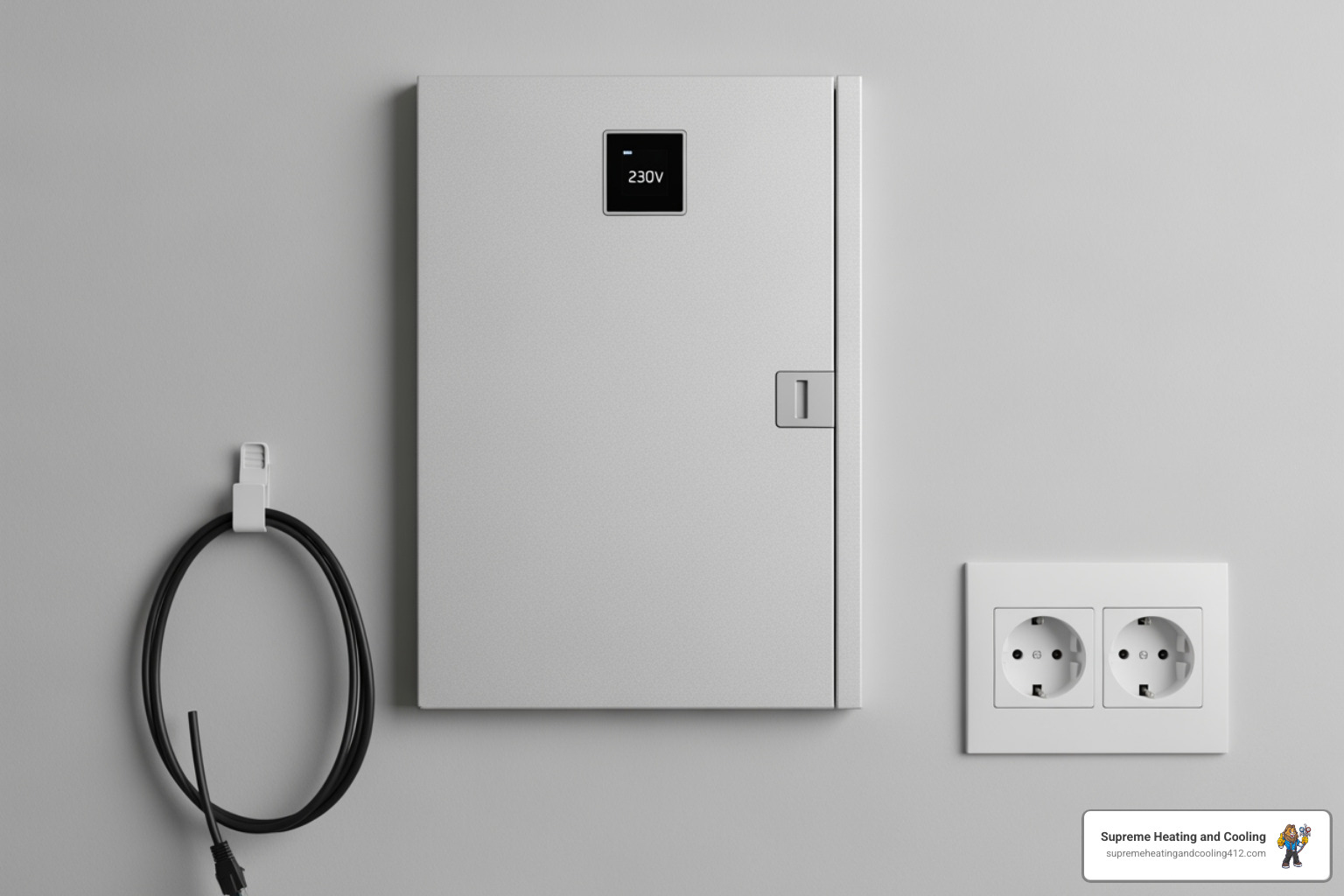
Why Your Home’s Electrical Safety Depends on Modern Technology
Fuse box replacement is a critical upgrade, replacing outdated, potentially dangerous technology with modern, safe circuit breaker panels. If your home has an old fuse box with ceramic fuses, the system is likely over 50 years old and may pose serious safety risks.
Quick Answer: Signs You Need Fuse Box Replacement
- Fuses blow frequently
- Burning smells or melted components around the electrical panel
- Flickering lights throughout your home
- Scorch marks or discolored wiring
- Your home is over 50 years old
- You’re planning major renovations or adding high-power appliances
Just as a faulty fuse box can cause widespread issues in a car, an aging fuse box in your home can be the root cause of many seemingly unrelated electrical problems.
Modern homes demand more electrical capacity than old fuse boxes can provide. With high-power devices like EV chargers and smart home systems, older fuse boxes are often overloaded and unsafe.
Modern circuit breaker panels offer superior safety, including RCD (Residual Current Device) protection, faster response times, and the convenience of flipping a switch instead of replacing a blown fuse.
Telltale Signs Your Fuse Box Needs Replacing
As our electrical needs evolve with smart homes and powerful appliances, your fuse box may struggle to keep up. Recognizing the signs of an overloaded system is crucial for your home’s safety.
Fuses are designed to melt and break a circuit during an overload. While an occasional blown fuse isn’t a major concern, frequently blown fuses signal that your system is being pushed beyond its limits, indicating an overloaded circuit or wiring issue.
Physical signs like overheating or burning smells from the fuse box are serious red flags. Scorch marks, discolored wiring, or melted components indicate a dangerous defect that requires immediate attention from a certified electrician.
Other symptoms of a failing fuse box include flickering lights in homes, appliances not getting enough power, strange noises from your electric panel like buzzing or humming, and visible electrical panel rust and corrosion.
The Dangers of an Old Fuse Box
An old fuse box is more than an inconvenience; it’s a significant safety risk, increasing the chances of electrical fires and shock.
Old fuse boxes lack modern safety features. They may not react quickly enough to prevent overheating, leading to electrical fire risks in homes. Degraded wiring and loose connections in these decades-old systems also increase fire hazards.
The risk of electric shock is also high. Modern panels have Residual Current Devices (RCDs) that quickly cut power during a fault, preventing serious shocks. Old fuse boxes lack this vital protection.
Very old fuse boxes may contain asbestos flash guards, which pose a serious health hazard if disturbed. This is a critical reason why only qualified professionals should handle older electrical systems.
An outdated fuse box can also invalidate your home insurance, as it may not meet safety standards or handle the electrical load of modern devices. Overloading the system, especially with extension cords, can lead to overheating.
When Should You Consider an Upgrade?
Beyond clear warning signs, there are proactive reasons to consider a fuse box replacement.
- Your Home is Over 50 Years Old: A fuse box indicates your electrical system is decades old. Its components are likely past their lifespan, making an upgrade necessary to safely support modern living and address common electrical issues older homes face.
- Planning a Major Renovation: Renovations like kitchen remodels often require more power than an old fuse box can handle. Upgrading the panel during the project is cost-effective and ensures your new space is properly powered.
- Selling Your Home: A modern panel is a key selling point, assuring buyers of the home’s safety and electrical capacity. An old fuse box can deter buyers or lower your home’s value.
- Adding High-Power Appliances: High-draw appliances like EV chargers, hot tubs, or tankless water heaters require more power than an old fuse box can provide. An upgrade is necessary to run them safely.
- Failing an Electrical Inspection: If an inspection reveals deficiencies with your fuse box, an upgrade is necessary for safety and compliance.
Fuse Box vs. Modern Circuit Breaker Panel: The Upgrade Explained
Comparing a fuse box to a modern circuit breaker panel is like comparing a 1970s car to a new one. While both protect your home’s circuits, the technology and safety features are vastly different.
The old way: A fuse box uses single-use fuses with a wire that melts to break the circuit during an overload. When a fuse blows, it must be replaced, often leaving you in the dark.
The modern approach: A circuit breaker panel uses switches that automatically trip when there’s a problem. To restore power, you simply flip the switch back on—no replacement parts needed.
Modern panels also include advanced safety technology far superior to old fuse boxes. The capacity difference is also significant. Old fuse boxes were designed for minimal electrical use. Today’s high-demand electronics and appliances require the higher capacity of a modern panel for safe and efficient operation.
Key Benefits of a Modern Electrical Panel
Upgrading to a modern panel is an investment in dramatically improved safety features. The most important is the Residual Current Device (RCD). An RCD shuts off power in as little as 30 milliseconds—faster than a blink of an eye—which can prevent a fatal accident.
Increased electrical capacity is another key benefit. Modern panels handle 200 amps or more, compared to the 60-100 amps of older fuse boxes. This allows you to run multiple high-power appliances simultaneously without overloading the system.
The convenience factor is significant. Instead of searching for a replacement fuse in the dark, you can restore power simply by flipping a tripped breaker switch at the panel.
This upgrade also delivers a higher home value. As one of the key electrical panel upgrade benefits, a modern panel signals safety and reliability to potential buyers, showing the home is ready for a modern lifestyle.
Types of Modern Consumer Units
Understanding the different types of modern panels helps you choose the best option for your home.
Main switch units are a basic upgrade with a main shutoff and circuit breakers but lack built-in RCD protection for every circuit.
Dual RCD units are a popular choice, splitting circuits into two groups, each protected by an RCD. This prevents a total power outage if one circuit faults.
High integrity units offer greater protection by using a mix of RCDs and individual RCBOs (breakers with built-in shock protection), so a fault on one circuit doesn’t affect others.
RCBO units are the premium option, providing each circuit with its own individual RCBO for maximum safety and minimal disruption.
Many modern units can also include surge protection devices to safeguard expensive electronics from power surges.
A fuse box replacement doesn’t just fix current issues; it future-proofs your home for tomorrow’s electrical demands.
The Fuse Box Replacement Process: What to Expect
Understanding the fuse box replacement process can put your mind at ease. This is a job for a licensed professional, not a DIY project.
The process starts with a professional assessment. An electrician will inspect your current system and discuss your needs (like adding an EV charger) to determine the right panel. This highlights why electrical inspections matter for home safety.
Installation day begins with a power shutdown for safety. Your home will be without power for several hours, so plan accordingly. With the power off, the electrician removes the old fuse box, labeling each wire. The new panel is then installed, sometimes requiring adjustments to meet current codes.
Next, all circuits are precisely reconnected to the new panel. The electrician then performs thorough system testing to ensure everything, including safety features, functions correctly. After testing, power is restored. You’ll receive a compliance certificate proving the installation meets safety standards. Keep this document for insurance and resale purposes.
Typical Costs for a Fuse Box Replacement
A fuse box replacement is a worthwhile investment in your family’s safety. Several factors influence the final cost:
- Panel size is a major cost factor. Larger homes with higher electrical demands need a panel with more amperage and circuits.
- Labor rates vary by location, and required permits can add to the cost while ensuring the work meets local codes.
- The condition of existing wiring can affect the cost. Old fuses may have masked wiring issues that modern, sensitive breakers will reveal, potentially requiring additional work.
- Accessibility to the panel can also impact labor costs. While surprises are possible, an experienced professional can often anticipate issues. Learn more about cost factors in our guide to a home electric panel upgrade.
How Long Does the Job Take?
A fuse box replacement is usually completed quickly by an experienced electrician.
For most homes, it’s a half-day job, with power restored by the afternoon, assuming straightforward wiring and no complications. A full-day job may be required for larger homes, complex systems, or if some outdated wiring needs to be updated at the same time.
Property size and wiring condition are the main factors affecting the timeline. Most jobs are completed within a single day unless significant rewiring is necessary.
Safety, Regulations, and Finding a Pro
A fuse box replacement is a major project involving your home’s electrical heart, with serious safety considerations. Electrical codes, including local requirements, are crucial safety standards developed over decades to prevent accidents.
Permits are almost always required for a panel upgrade. The resulting inspection provides an independent safety check, ensuring the work meets all standards. This is why a fuse box replacement must be done by a certified electrician. They understand complex systems, codes, and safety protocols, and carry the necessary licensing and insurance.
Our commitment to electrical services for a safe home means we never cut corners on safety, having seen the risks of improper electrical work.
DIY Fuse Box Replacement: Is It a Good Idea?
DIY fuse box replacement is extremely dangerous. Unlike other home projects, it involves significant risks.
- The electrocution risk is immediate and potentially fatal. You’re dealing with the main power feed to your home, work that even professionals approach with extreme caution.
- Improper installation creates a serious fire risk. A loose connection can generate heat and ignite surrounding materials.
- Code violations from DIY work create long-term problems, including issues when selling your home. Insurers may also void your coverage if a fire results from unpermitted work.
- Legal issues are also a concern, as many areas prohibit homeowners from doing this work and impose heavy fines.
These risks highlight the importance of home electricians. Professionals are trained, experienced, and stay current with codes and technology.
How to Find a Qualified Electrician
Finding a qualified electrician for your fuse box replacement requires some homework but ensures safety and quality.
- Check credentials: Ensure the electrician is licensed and insured in your state. A true professional will gladly provide these documents.
- Ask for references: Contact previous customers to ask about the electrician’s professionalism, timeliness, and work quality.
- Get multiple quotes: Compare at least three quotes to understand the scope of work and pricing. Be wary of unusually low bids.
- Review contracts: The contract should clearly detail all materials, labor, permits, and timelines. If it’s not in writing, it’s not included.
- Look for experience: Choose an electrician with specific experience in panel upgrades and fuse box replacements.
- Read online reviews: Look for consistent patterns of positive feedback regarding professionalism, safety, and quality.
- Trust your instincts: A good electrician will be patient, answer your questions clearly, and never pressure you.
At Supreme Heating and Cooling, our team combines technical expertise with friendly, trustworthy service. We provide expert electrical services with the professionalism your home deserves.
Frequently Asked Questions about Fuse Box Upgrades
Upgrading your electrical system is a big decision. Here are answers to common questions about fuse box replacement.
Why do my fuses keep blowing?
Constantly replacing blown fuses is a sign your electrical system is sending a warning.
- Circuit overload is the most common cause. Old systems weren’t designed for the demands of modern electronics, leading to overloads that can also cause issues like needing to prevent electrical outlet overheating.
- A faulty appliance drawing too much power can also be the cause. Try unplugging devices on the affected circuit to identify the culprit.
- A short circuit, where wires touch, creates a dangerous power surge that blows fuses instantly. This is a serious fire hazard requiring immediate professional help.
Repeatedly replacing fuses only masks the underlying problem instead of fixing it.
Can I just replace the fuses instead of the whole box?
While replacing fuses is cheaper than a full upgrade, it’s a temporary fix that doesn’t address the root cause of the problem. It’s a temporary solution that doesn’t fix the core issues. The old fuse box will still lack the capacity for modern demands and the safety features to protect your family.
Ignoring the warning of blown fuses means you’re not addressing the fact that the old fuse box doesn’t fix underlying issues of capacity, safety, or component wear. Crucially, replacing fuses doesn’t improve safety or capacity. You’re left with the same risks and limitations while missing out on life-saving features like RCD protection.
Will a new panel increase my home’s value?
Absolutely. A new panel is an investment that increases your home’s value and your peace of mind.
- Yes, it’s a genuine safety improvement that appeals to buyers. A modern panel shows the home can safely handle a modern lifestyle, free from electrical worries.
- The modernization signals that you’re a responsible homeowner, and buyers appreciate not having to budget for an immediate electrical upgrade.
- The appeal to buyers is also about capacity. An upgraded panel shows the home is ready for home offices, EV chargers, and other modern electronics.
Some insurers also offer better rates for homes with modern electrical systems. Consider the many reasons for electric panel upgrade as an investment in both safety and value.
Secure Your Home’s Electrical Future
Your home’s electrical system powers your daily life. An outdated fuse box is a 50-year-old system struggling to meet modern demands. Modern safety standards have evolved significantly. Today’s circuit breaker panels include life-saving features that old fuse boxes lack.
Protecting your family is the top priority. A fuse box replacement ensures your system can safely handle modern electrical loads, preventing future problems. It’s an investment in your property’s future, making your home safer, more valuable, and more attractive to buyers.
An upgrade provides peace of mind. You get reliable, safe power without the worry of blown fuses or dangerous electrical issues.
If you’ve seen these warning signs or have an old fuse box, don’t wait for an emergency. Our team is here to guide you through the process with friendly, professional service.
For professional and trustworthy Fuse Box Repair in Penn Hills, contact our experts today. We’re committed to providing the reliable electrical solutions that keep your home safe and your family protected.

.svg)

.webp)


.svg)
.webp)
.svg)
